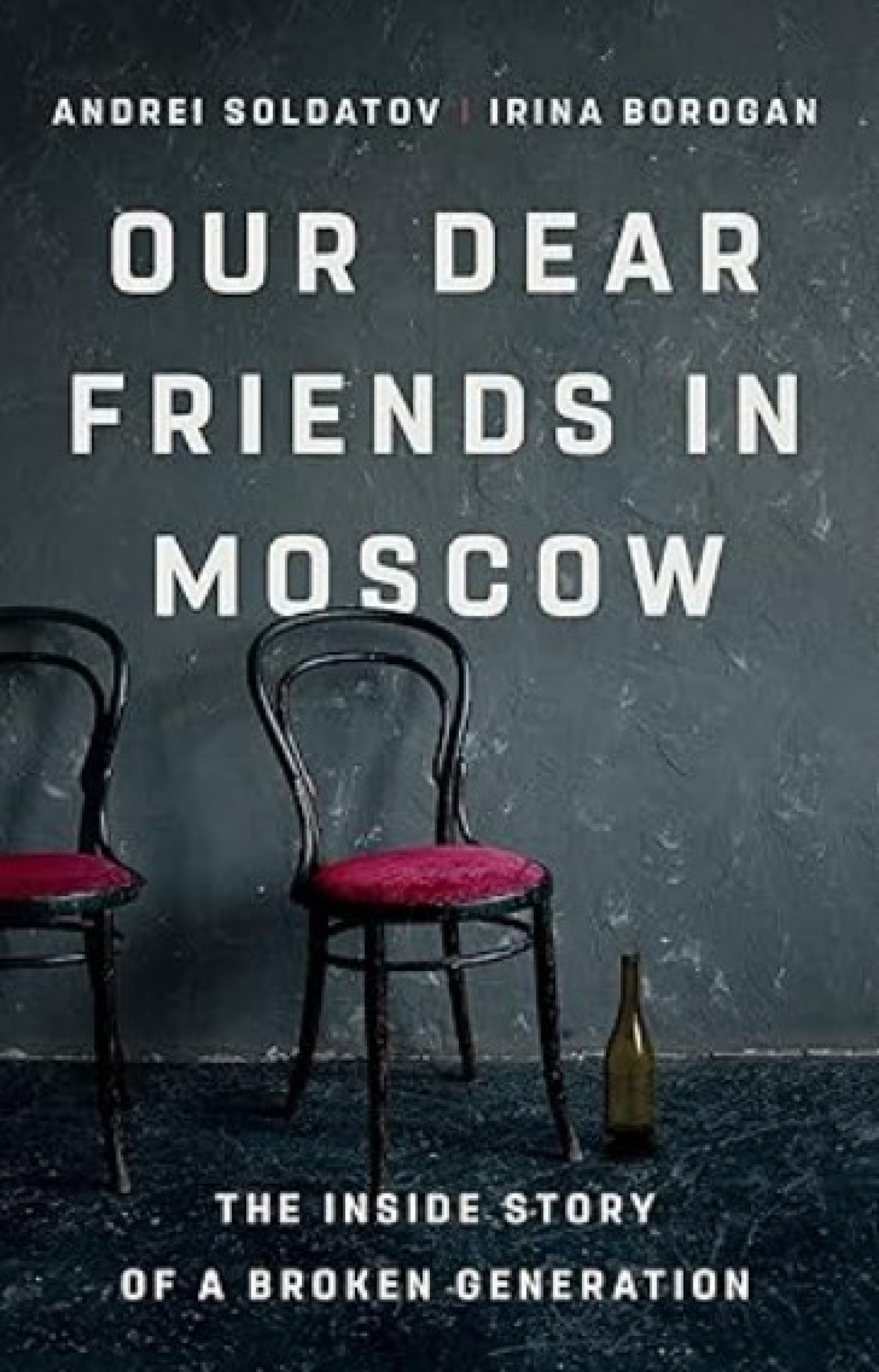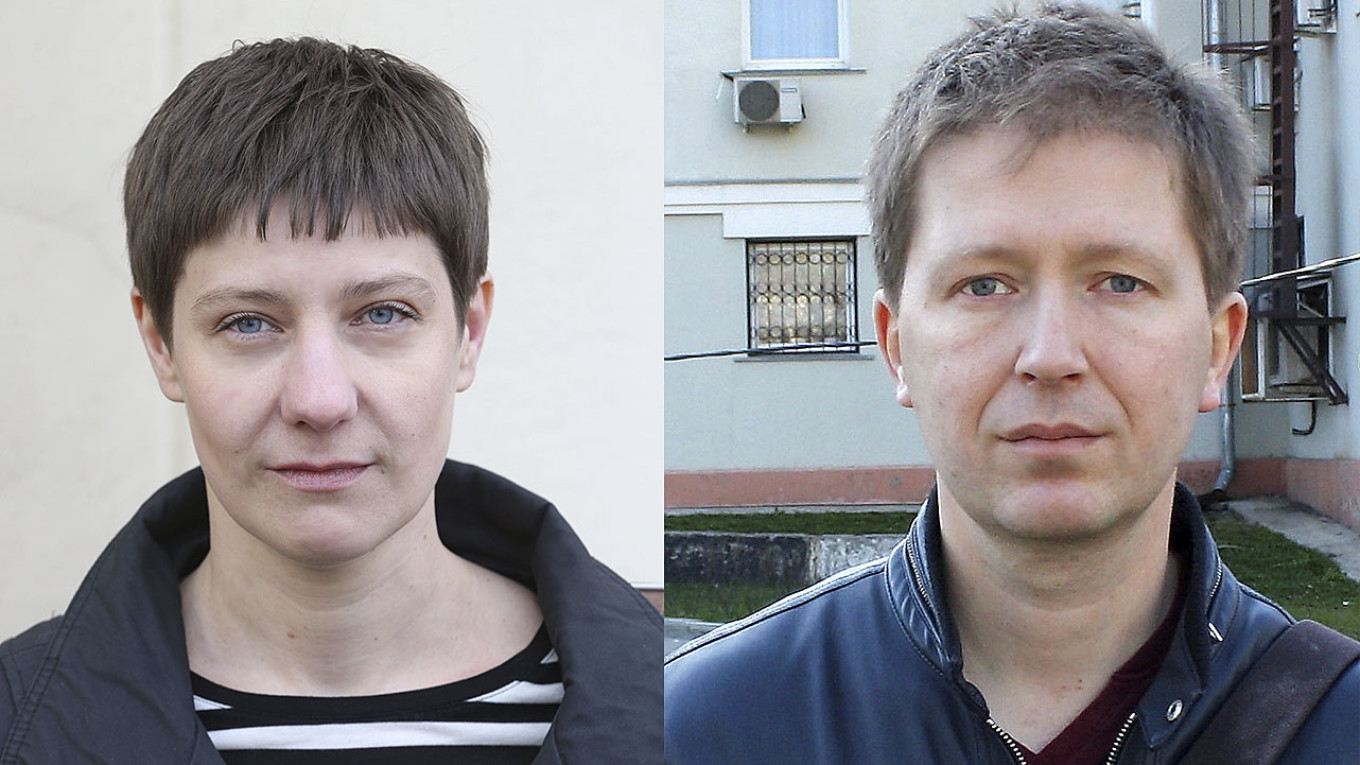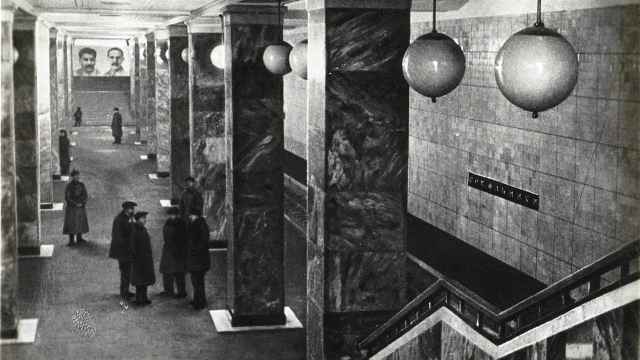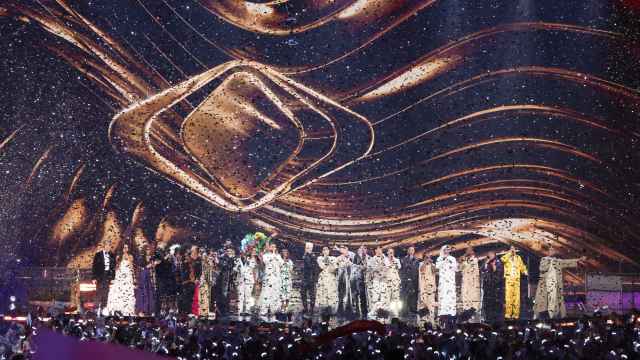In “Our Dear Friends in Moscow. The Inside Story of a Broken Generation,” journalists Irina Borogan and Andrei Soldatov set out to understand how some of their fellow journalists in Russia came to accept wholeheartedly the actions of Vladimir Putin’s government.
Their friends are not uneducated Russians with no access to anything but official Russian government information. They are a group of highly educated, multilingual, well-traveled journalists who have spent their professional lives punching holes in governmental falsehoods. “What happened?” they ask. “How could we have ended up on such violently opposed sides?”
The book begins in the first years of Vladimir Putin’s presidency when the two journalists are working at the newspaper Segodnya (Today), once the most popular newspaper in Russia. It ends when they are living in exile in the U.K. with Soldatov on Russia’s “most wanted” list.
In 2000 Soldatov and Borogan join the staff of Izvestiya and quickly become friends with their co-workers: Evgeny Krutikov, the descendant of an elite Soviet family; Zhenya Baranov, a war correspondent, and his wife Olga Lyubimova, a TV host; Petya Akopov, the intellectual of the group; and Sveta Babayeva, a reporter in Putin’s press pool.
The group of friends work together, spend evenings talking and drinking on park benches along leafy boulevards in good summer weather, or in one of the new clubs where everyone seemed to know everyone else, or in the spacious communal apartment where Petya Akopov and his wife Marina live on Gogolevsky Boulevard.
This is a group of smart, young, talented, ambitious people in a country that is being transformed — however corruptly and unfairly — and offers endless opportunities for professional growth. Most of them become richer, although in fits and starts. Thanks to foreign book contracts, Soldatov and Borogan are able to finally stop renting apartments in the outskirts and buy their own apartment. They and their friends travel abroad and enjoy some of the pleasures of newly affluent Moscow. The journalists all move to work in different places, but they continue to see each other socially and professionally.
Over the years it becomes more difficult for Soldatov and Borogan to work in Moscow. Specialists in the Russian security and law enforcement services, they are the founders of Agentura.ru, a site that tracks the work of the Russian intelligence agencies. They are forced to move from publication to publication, sometimes when their editors succumb to state demands to toe the new party line, sometimes when they are fired for their work that displeases the security services. Soldatov’s father, Alexei, one of the founders of the Russian internet who served as Deputy Minister of Communications in 2008-2010, is arrested, convicted of “transferring a pool of IP addresses to a foreign-based organization” and sentenced to two years in jail despite his advanced age and terminal illness.
But in 2002 when terrorists seize the Dubrovka theater and more than 100 hostages die needlessly, their editor and friends are still on the same page. “Evgeny Krutikov was just as appalled as we were by the government response to the crisis — he wrote his own piece about the lack of coordination and planning and the confusion among the security services during the first two days.”
But by the crisis in Beslan two years later, where another group of terrorists take over a school and 186 children die in the ham-fisted government “rescue mission,” things have changed. Putin comes to Beslan after it is over and blames the collapse of the Soviet Union for the country finding itself “unprotected from either the West or the East.” Soldatov and Borogan are appalled, but their friend Baranov is ecstatic, comparing Putin’s words to Stalin’s speech after Nazi Germany attacked the U.S.S.R. “I think it was like Stalin’s ‘Brothers and Sisters’!”
And after a rally in 2011 where Alexei Navalny calls for regime change, Petya Akopov writes a brutal Facebook post: “To imprison him is impossible; leaving him in the wild for a long time is also dangerous (primarily because he will provoke “blood on the streets”— this is part of his program). The third option remains— remove him. And at the same time, blame it on the same Americans… I think that, given all the costs, this is the best option. Not only for Putin, but also for the country. Better the blood of one than the blood of millions.”
And so it goes. Over the years and during the country’s aggression in Georgia and Crimea; street protests; the murder of journalist Anna Politkovskaya; the arrest, poisoning and murder of Alexei Navalny; Ukraine’s “Maidan” movement; and Russia’s war in Ukraine, Baranov, Akopov and Krutikov not only become more aligned with Putin’s positions, they break all the rules of journalism to promote them.
Meanwhile, their women friends are not entirely uncritical of the government, but thanks to protection in high places they have storied careers: Lyubimova rises through the ranks to become Minister of Culture; Babayeva is assigned to the enviable postings as head of RIA Novosti in London and Washington. Before finishing the book Soldatov and Borogan contact their friends and ask them to speak about their views. Some won’t or can’t respond; some are unrepentant.
“Our Dear Friends in Moscow” is an unsettling but essential read — not only to understand how the regime co-opted the journalists and citizens in Russia, but to prepare for it in other countries, too.
"Our Dear Friends in Moscow. The Inside Story of a Broken Generation"

Chapter 17: Return of the Empire
“Is that true that Muscovites do not know what to do with all their money?” “Do all Muscovites live now in penthouses?” We were often asked these or similar questions by our contacts and relatives in regions far from Moscow, in tones of admiration and envy.
In the mid-2000s the middle classes in Moscow enjoyed a sharp increase in the quality of life never before experienced in Russian history. Oil prices skyrocketed and so did salaries as Russian and Western companies expanded their presence in Moscow and aggressively recruited local staff. Shopping malls and giant chain stores such as IKEA were mushrooming across the city and its suburbs. Accountants, lawyers, sales managers, and advertisers rushed to buy new cars and get mortgages for their fancy flats in the capital. Brand- new suburban settlements with lines of cottages took the place of old Russian villages in a fifty- mile- wide belt around Moscow.
In 2000 we could have driven from our apartment in a northern suburb to Izvestia in twenty-five minutes and parked our car for free on Tverskaya, Moscow’s main street; seven years later, the same trip took an hour and a half, and parking in the center of Moscow became impossible. Mercedes of all shapes, Audis (the Russians developed big thing for luxury German car brands), and Lexuses lined the streets, invading sidewalks if they had to.
Muscovites learned how to make good money, and they wanted to spend it. One New Year’s Eve, Irina went to a perfumery and make-up boutique called Île de Beauté near Novaya Gazeta’s offices. It was full of excited shoppers pushing shopping carts full of colorful boxes of Chanel, Dior, and Shiseido. Muscovites had swiftly adapted to a lifestyle that was unimaginable to their parents in the Soviet Union.
Moscow, along with several other big Russian cities, became a consumer paradise, and Muscovites were proud of it, but it was not enough. Now they needed something bigger to be proud of — something about the country and its place in the world. Soon the Kremlin duly provided the reasons.
In August 2008 Moscow felt half-empty. Many families were on vacation or spending time at their dachas. Those who remained in the city preferred having cold drinks on the shady terraces of bars — all the outside tables at Jean-Jacques [a restaurant popular with journalists – MT] were taken — to following the news, especially if the news concerned a faraway place like South Ossetia or Georgia.
Very few people in Moscow seemed to remember the tragic and bloody history of the early 1990s, when the South Ossetians, backed by Moscow, had split from Georgia, which caused a military conflict. The bloodshed was eventually stopped, and a ceasefire signed, guaranteed by the presence of Russian peacekeepers.
But the Georgians never gave up hope of taking the breakaway region back, and the South Ossetians hated the idea of living with the Georgians. The sporadic and senseless conflict smoldered for years.
At the beginning of August 2008, the shelling between the two sides intensified, but the press conference where Krutikov’s friend Medoyev, South Ossetian envoy in Russia, threatened to launch a “railroad war against Georgia” went mostly unnoticed in Moscow.
All that changed in the early hours of August 8, when the Georgian army’s Grad multiple rocket launchers set off shelling the South Ossetian capital of Tskhinvali and Georgian tanks rolled into its streets.
What happened next surprised most Russians. President Dmitry Medvedev addressed the nation on Russian television. He accused the Georgians of acts of aggression against Russian peacekeepers and civilians, in that order. He added that most of the casualties in South Ossetia were Russian citizens and promised a swift retaliation. He sounded almost like Vladimir Putin, except without Putin’s signature obscenities.
As Medvedev was speaking, the Russian army was moving into South Ossetia through the long and narrow Roki Tunnel. Within a few days, Russian troops pushed the Georgians out of Tskhinvali, but they didn’t stop there and swiftly invaded Georgia. Russian tanks occupied the Georgian town of Gori and several villages, stopping just forty-seven miles from the Georgian capital, Tbilisi. A ceasefire agreement was signed.
In Moscow, the victorious five- day war was received with enthusiasm bordering on euphoria. Medoyev and Krutikov were happy because finally Russia had backed with full force the separatist cause they had promoted for years.
But there was also jubilation among Moscow’s middle classes. To them, Russia’s victory was a sure sign that Russia was back on the global stage. They also understood that for all Medvedev’s tough talk, it was Putin who had called the shots. Medvedev as president was commander in chief, but everyone knew that as part of his deal with Medvedev, Putin retained control over the security services and the army.
“It was so cool how we put the Georgians in their place. Finally, we are strong again, and all thanks to Putin!” Kirill, a pink-faced, chubby-cheeked, twenty-something manager of an advertisement agency that Agentura worked with, was in a state of rapture. We were meeting with him on Manezhnaya Square shortly after the ceasefire to talk about our business relationship. Manezhnaya Square was the place where a huge crowd of democratic Muscovites had gathered to support Boris Yeltsin in 1991, which had led to the dissolution of the Soviet Union, a fact Kirill was hardly aware of. Well-educated, mild-mannered, and always optimistic, Kirill was sincerely and visibly excited about the Russian invasion of Georgia, Putin’s first external war.
Nine years before, Putin had gotten public support for his war in Chechnya because the Russians feared terrorist attacks, and Putin promised to deal with terrorists, as brutally as possible. This time, he secured wide public support because of wounded pride. Putin’s approval rating reached a record high of 88 percent in September, and even Alexei Navalny, who would become Putin’s main antagonist, supported the Russian war against Georgia, calling its citizens rodents.
“Before this, no one respected us on the globe. For how long could we tolerate this?” Kirill exclaimed. “Yeltsin destroyed everything in the country, especially the army, and now we’ve made the world go round, and the Americans respect us.”
Kirill was a decent, smart guy, and his shallow nationalism made us sad and angry. The true story of the war was much more complicated than the message promoted by the Kremlin. Novaya Gazeta published several investigations outlining how the Russian army had been carefully preparing for war, secretly buffing up its military presence in South Ossetia, well before August 8. But for Kirill, and many like him, that didn’t register. What mattered was that Russia had rediscovered its swagger.
***
A week after the five- day war in Georgia, Nikolai Svanidze’s long-awaited book about Medvedev made it to the bookstores. But on the way, it had lost its subtitle, Conversations Accompanied by Music. Apparently, in the ramp- up to war, Medvedev had deemed it inappropriate to promote himself as a sensitive and intelligent leader. Instead, the book had no subtitle at all.
On August 26, Medvedev signed two presidential decrees recognizing South Ossetia and Abkhazia, the second breakaway region from Georgia, as two independent states, and establishing diplomatic relations with both.
When they heard the news, Krutikov and Medoyev [his Ossetian friend- MT] rushed out of their apartments into the street in Moscow where they both lived. There on the tiny, usually very quiet lane at the back of Moscow’s Prospekt Mira highway, the two men danced, hugged, and screamed in jubilation. They’d gotten what they wanted. Medoyev was immediately appointed the first ambassador of South Ossetia to Russia. Krutikov felt that justice was done: South Ossetia had become independent. But he didn’t want South Ossetia to be incorporated into Russia.
“Russia can’t do that,” he would tell us years later. “It would be an annexation, full stop, and we don’t want it. Because it would harm Russian interests in other parts of the world. Next time Russia would send soldiers abroad to help other nations, the world would scream ‘annexation!’”
Petya Akopov saw it differently. The first issue of the magazine he edited after the war had on its cover a drawing of Medvedev on a Russian tank, a statue of Stalin, and a big, bold headline: “Return of the Empire.”
From “Our Dear Friends in Moscow. The Inside Story of a Broken Generation,” written by Irina Borogan and Andrei Soldatov and published by PublicAffairs. Copyright © 2025 by Andrei Soldatov and Irina Borogan. Used by permission. All rights reserved. Footnotes have been removed to ease reading. For more information about the author and this book, see the publisher’s site here. The book will go on sale June 3.
A Message from The Moscow Times:
Dear readers,
We are facing unprecedented challenges. Russia's Prosecutor General's Office has designated The Moscow Times as an "undesirable" organization, criminalizing our work and putting our staff at risk of prosecution. This follows our earlier unjust labeling as a "foreign agent."
These actions are direct attempts to silence independent journalism in Russia. The authorities claim our work "discredits the decisions of the Russian leadership." We see things differently: we strive to provide accurate, unbiased reporting on Russia.
We, the journalists of The Moscow Times, refuse to be silenced. But to continue our work, we need your help.
Your support, no matter how small, makes a world of difference. If you can, please support us monthly starting from just $2. It's quick to set up, and every contribution makes a significant impact.
By supporting The Moscow Times, you're defending open, independent journalism in the face of repression. Thank you for standing with us.
Remind me later.







